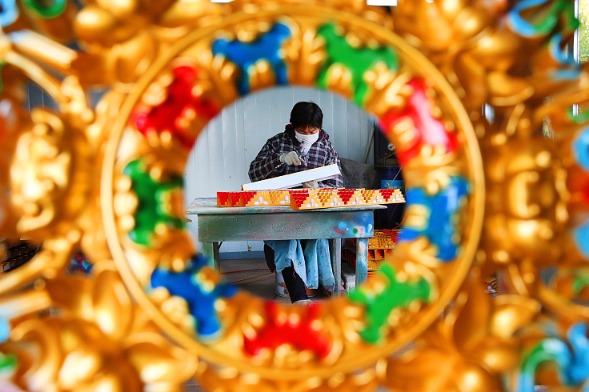Legislator gives working women in Japan a strong voice and a face
Hardly had the 42-year-old lawmaker Yuka Ogata, carrying her seven-month-old son, sat down in the Kumamoto Municipal Assembly when four male members including Chairman Yoshotomo Sawada asked her why she had brought the baby into the chamber. Eventually, officials of the assembly on Kyushu Island in southern Japan booted her out, citing a rule that "visitors" are forbidden from the floor during a session.
Ogata said she had carried her son to the assembly on her first day back at work after giving birth in the hope of "visualizing the poignant voices of women struggling to balance between work and child-rearing".
Even though we continually raise our voices about the limits of what can be handled on a personal level and no matter how much we fight, as Ogata argued, nothing changes. "So I thought the only way they would listen was to bring my son to my assembly ... I wanted to give those struggling voices a face," she said. The male-dominated legislature in Japan is not friendly to woman lawmakers. And sexist taunts have been heard in Japan's parliament and local assemblies.
In 2014, Ayaka Shiomura, a legislator of the Tokyo Metropolitan Assembly, was heckled by five male officials and insulted with comments such as "You should get married" and "Can't you even bear a child?" when she gave a speech urging increased public support for pregnant Japanese women.
And a woman lawmaker of Osaka Municipal Assembly was called "a salary thief" after she took maternity leave to give birth.
Women occupy less than 13 percent of Japan's local assembly seats. The ratio of women in parliament's lower house is about 10 percent. Japan ranks 114th among 144 countries, one of the worst among industrialized countries, according to a report on global gender gaps released by the World Economic Forum in November.
The Japanese government has vowed to spend some $7 billion to expand the country's free preschool program. But a deeper problem lies in the shortage of nurseries, leaving more than 20,000 children on the waiting list.
People believe political empowerment of women is the answer to many of the women's problems. US political scientists Tali Mendelberg and Christopher Karpowitz conducted an experiment. After the male and female participants were divided into separate groups, it produced some striking results. When women were in majority in the group, men spoke more about caretaking issues. In groups with one man and four women, 62 percent of the men raised the topic of children, compared with just 19 percent of the men in groups of four men and one woman.
These findings show that when women's voices are not heard, the issues women care about are not considered relevant or essential. They are considered separate women's issues instead of everybody's issues, says Anne-Marie Slaughter, president and CEO of the US think tank New America, in her popular book, Unfinished Business. Slaughter worked as the first woman director of policy planning for the US State Department under the Barack Obama administration in 2009 and quit the high-powered but demanding job in 2011, returning to academia so that she could spend more time with her husband and two teenage sons.
When women have greater standing, as Mendelberg and Karpowitz put it, men share the floor more equally, adopt the language of care for children more often, endorse more generous safety net support for the poor, are less likely to interrupt women in hostile ways, and provide more positive forms of support and encouragement to female speakers.
In Japan, a woman won a seat in the lower house of parliament for the first time in 1946. Tokyo now has its first woman governor, Yuriko Koike, who is single. And Japanese Prime Minister Shinzo Abe has pledged to enable all women to shine. The picture of Yuka Ogata with her baby on her lap in the Kumamoto Municipal Assembly shows that Abe needs to work harder to turn his promise into reality for Japanese women.
The author is China Daily Tokyo bureau chief. caihong@chinadaily.com.cn
(China Daily 12/18/2017 page9)


















